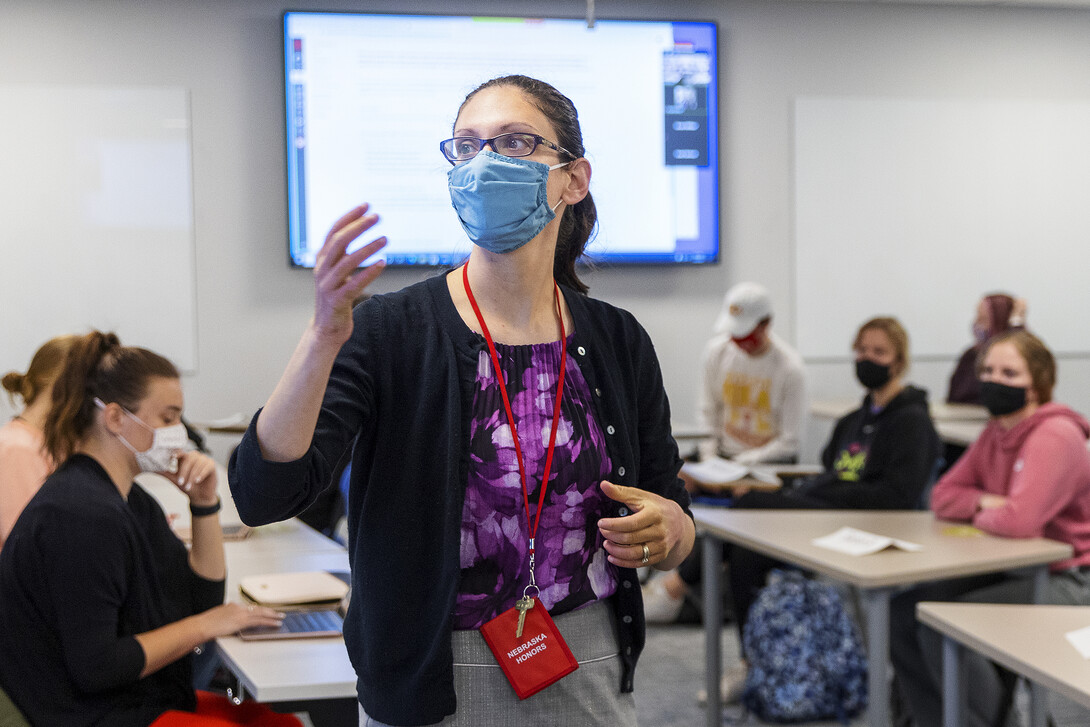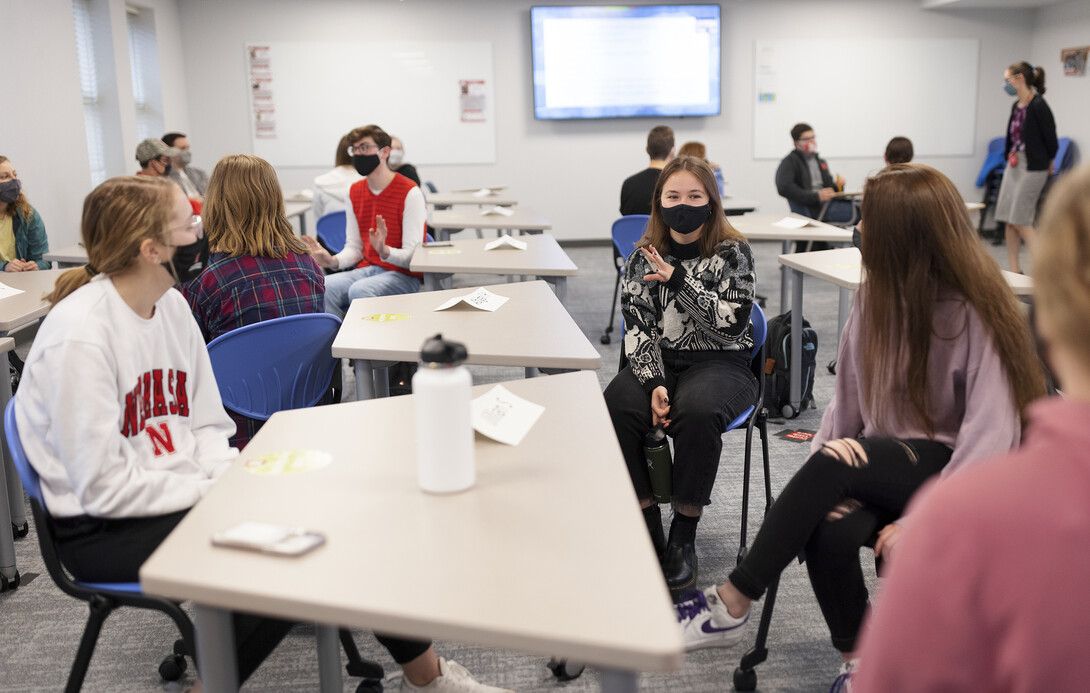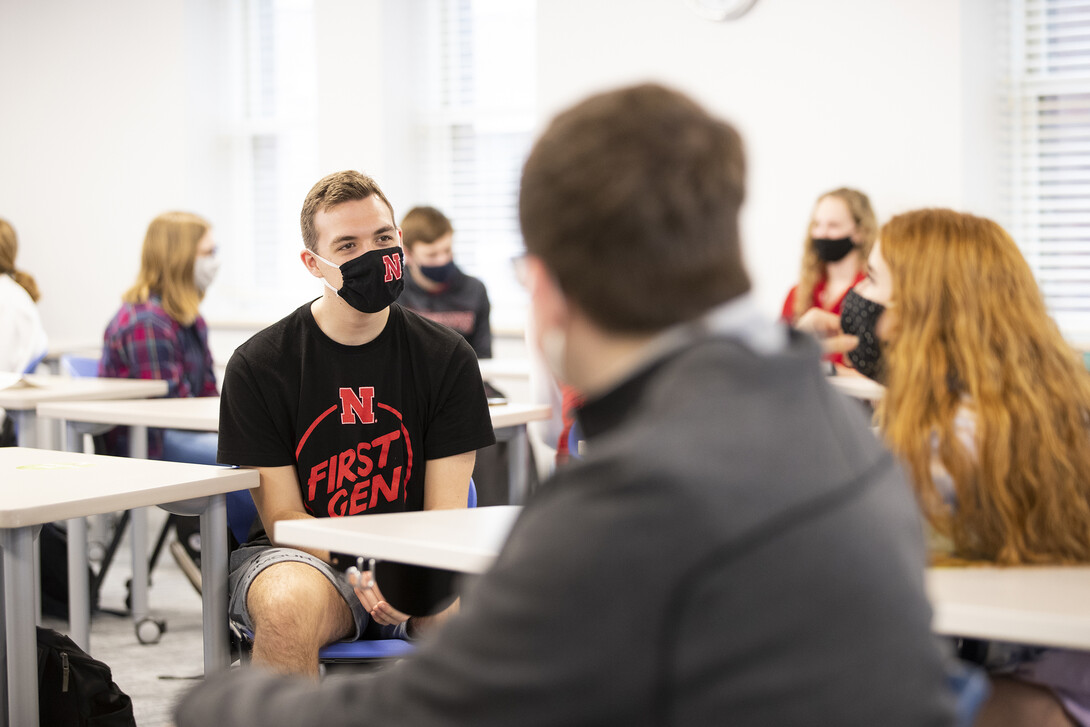
What makes a human a fully sentient person — nature or nurture?
It’s both, and a new course launched for all first-year students in the University of Nebraska–Lincoln Honors Program is helping them understand who they are and why.
The Science of You is a once-a-week interdisciplinary class delving into some of the many facets that shape a person. Topics range from nutrition and geography to social media. More than 500 students are taking the class this semester. There are 18 sections — 14 in-person, four online — taught by seven different instructors.
“(The course) gives students the space to reflect critically on the forces that have shaped them into the people they are today, from food to family to identity, privilege, belief and more,” said Jacob Schlange, assistant director of experiential learning and global initiatives for the Honors Program.
The goals of the course are to teach interdisciplinary thinking and systems thinking, as well as to encourage empathy and understanding while building camaraderie among the Honors student cohort.

“We were trying to meet those needs for our students in our curriculum and to provide them with a holistic learning experience,” said Patrice McMahon, director of the Honors Program. “As a staff, we got together and invited a broad range of faculty to help us think through what a class like this would look like (and) that would also help students find their purpose at Nebraska.
“This is a class that we think helps students put together the pieces of their own life as a way to help them launch their careers at UNL — their academics, and also their intellectual and personal careers.”
The class begins with more basic topics, such as nutrition, and leads into the more personal. This is by design, to build a level of comfort and safety, Schlange said.
Prior to each class, students are asked to complete readings or watch films and videos that explore the week’s topic. In class, students are regularly put into small groups — led by undergraduate learning assistants — to have lively discussions about their own experiences and how those experiences have shaped them and their classmates.
“The conversations that we have in the class are just amazing, about identity, about privilege, about their hometowns,” McMahon said. “They’re also talking about how we make assumptions about others and where they’re from.”
For a final project, students develop their own module on a topic not covered in the course.
“There are so many topics that we can’t cover because we have to narrow it down, but we want to hear from the students what they’d want or need in class, and the final project gives them the opportunity to create possibilities for future classes,” McMahon said. “As instructors, we need to make sure university classes are evolving to meet students’ needs and to help them negotiate an interdisciplinary world that values communication, collaboration and teamwork.”

Schlange said the class wouldn’t be possible without the undergraduate learning assistants, all of whom either took a pilot version of the course last year or have served as peer mentors for the Honors Program.
“We’re very, very fortunate to have 20 student leaders who are helping us as learning assistants,” Schlange said. “Every section has two learning assistants who are upperclass students. They are such a great help in terms of facilitating conversations. They each get to lead their own full module, so it’s a great developmental opportunity for them, but we could not have scaled up the class without them.”
With fewer opportunities for socializing outside the classroom due to pandemic restrictions, the course is serving another important function.
“Most first-year Honors students live in Knoll Hall, but a lot of them haven’t met very many people beyond maybe their roommates or the rest of the floor, because of social-distancing guidelines. This course provides an opportunity for them to expand that Honors community, because they’re getting to know each other in the class now, as well,” Schlange said.
In the future, McMahon said they’ll offer more social activities related to the course to spur further discussion and fellowship among the students.
“We had planned a lot of experiences for students — not just in the classroom but watching movies together, having different opportunities for extra credit to take advantage of different resources on campus — but we couldn’t do that this year,” she said. “They’re watching these films mostly alone this year, but next year, we’d really like to build on it to have pizza parties and popcorn nights and community activities to explore them inside and outside the classroom.”







